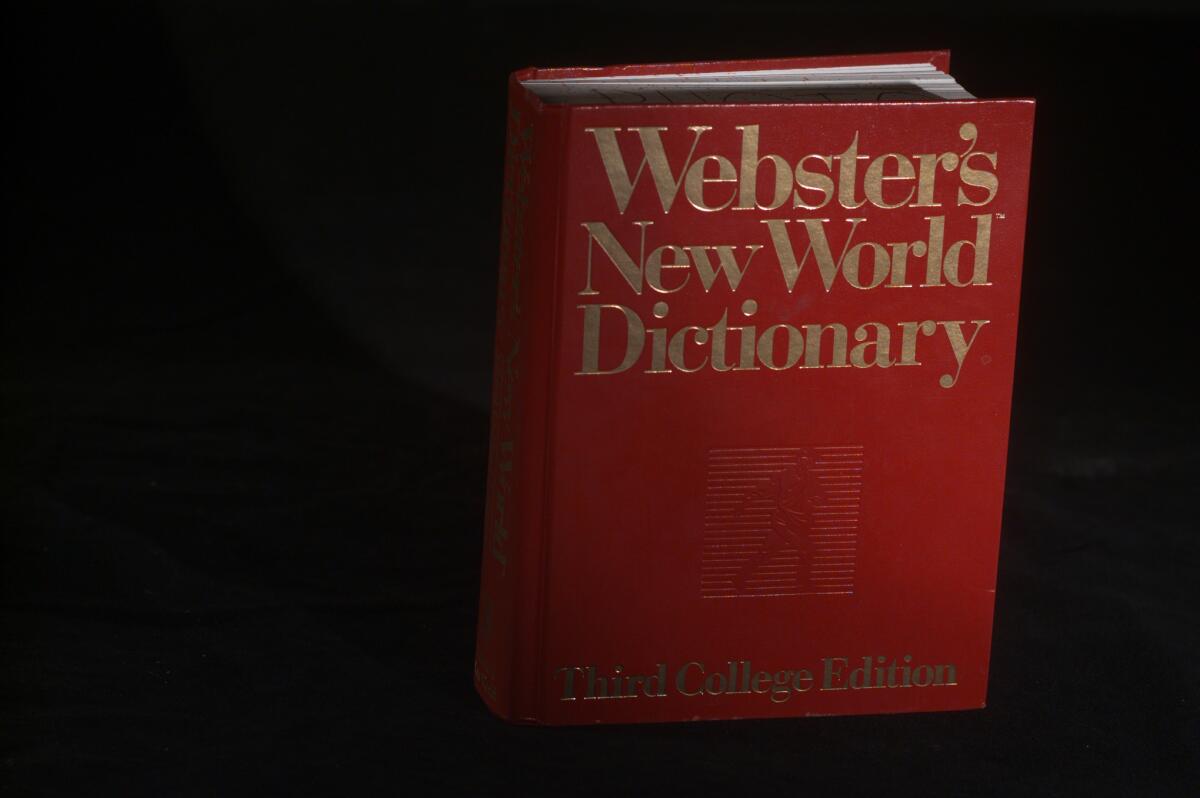A Word, Please: What is the difficulty with ‘what’ clauses?

- Share via
Sometimes grammar is easy. You don’t even have to understand it to get it right. For example, without knowing the first thing about verb conjugation or subject pronouns, you probably have no difficulty choosing between “I want pizza” and “Me wants pizza.”
Other times, grammar is hard — so hard that even editors and writers struggle to understand what we’re doing. Case in point: a recent Twitter poll by Ellen Jovin, grammar expert and author of the forthcoming book “Rebel Without a Clause.”
She asked followers — many of them professional editors and all of them language buffs — to choose between “What she enjoys is dictionaries” and “What she enjoys are dictionaries.” Exactly 42.9% of respondents chose “is” and 42.9% chose “are.” Just 11.9% chose “could be either.”
If you’re ever taking a multiple choice quiz about grammar and find yourself stumped, “could be either” is usually a good guess. English is flexible. There’s often more than one way to say something grammatically. Plus, even constructions that defy the rules of grammar, like “aren’t I” in place of “amn’t I,” can be idiomatic, which makes them acceptable.
So if you guessed “could be either” for Jovin’s question, you would be right. But what if you don’t want to guess? What if you want to understand how that sentence works?
I usually start with a dictionary. Among its many definitions of “what,” Merriam-Webster’s includes “the thing or things that.” This means “what” can be singular or plural, so it can take a single or plural verb depending on the predicate noun: “What is kombucha” is right, and so is “What are fava beans”?
But in Jovin’s sentence, it’s not quite that simple because “what” isn’t the subject of the sentence. A whole clause is: “what she enjoys.”
So is our subject, “what she enjoys,” singular or plural? Neither, exactly. But whether you should treat it as singular or plural mostly depends on whether “what” refers to something singular or plural. In Jovin’s sentence, the “what” means “dictionaries” — that’s the noun in the predicate to which “what” refers.
Grammar columnist June Casagrande explains why a knowledge of phrasal verbs — or a quick look at the dictionary — can help figure out what words to choose.
“When the ‘what’ in the what-clause is the object of the clause and when the predicate noun following the main verb is plural, it tends to pull the verb with it,” explains Merriam-Webster’s Dictionary of English Usage.
So because “dictionaries” is the predicate noun in Jovin’s sentence and because it’s plural, the sentence is best with the plural verb “are”: What she enjoys are dictionaries.
Note Merriam’s language: “tends to pull the verb with it.” This tells you we’re not dealing with hard-and-fast rules. You have some flexibility. But if your “what” refers to something plural, a plural verb like “are” will probably work best.
Variations on these sentences can get complicated, like “What is puzzling are the complaints of some guests that the drinks were weak.” It’s easy to see why “are” is the natural partner of the plural “complaints.” But the “is” in the subject clause doesn’t seem to make sense until you realize that not all “whats” are governed by a noun in the predicate. In this case, “what” clearly means “the thing that,” singular, even though the predicate noun, “complaints,” is plural.
Garner’s Modern American Usage explains that sentences like this arise through a process called inversion, which just means the way we flip some sentences around.
“What is puzzling are the complaints” is just an inverted way of saying “the complaints are puzzling” that throws in the “what” simply for emphasis.
If you want to understand these sentences in every possible form, pick up a usage guide like Merriam’s or Garner’s, which examine all the different ways that “what” clauses can work. But the bottom line is usually the same: When the “what” refers to something plural, it “tends to pull” the main verb along with it. In most cases, this means that whatever sounds best to you is the best choice — or at least a decent one.
June Casagrande is the author of “The Joy of Syntax: A Simple Guide to All the Grammar You Know You Should Know.” She can be reached at JuneTCN@aol.com.
All the latest on Orange County from Orange County.
Get our free TimesOC newsletter.
You may occasionally receive promotional content from the Daily Pilot.






